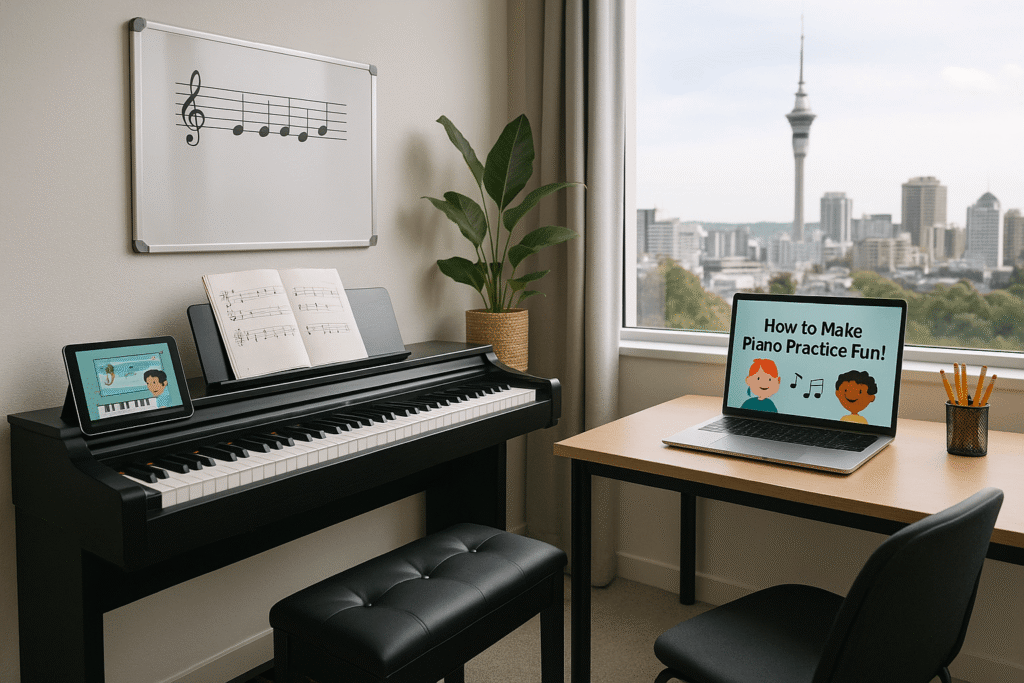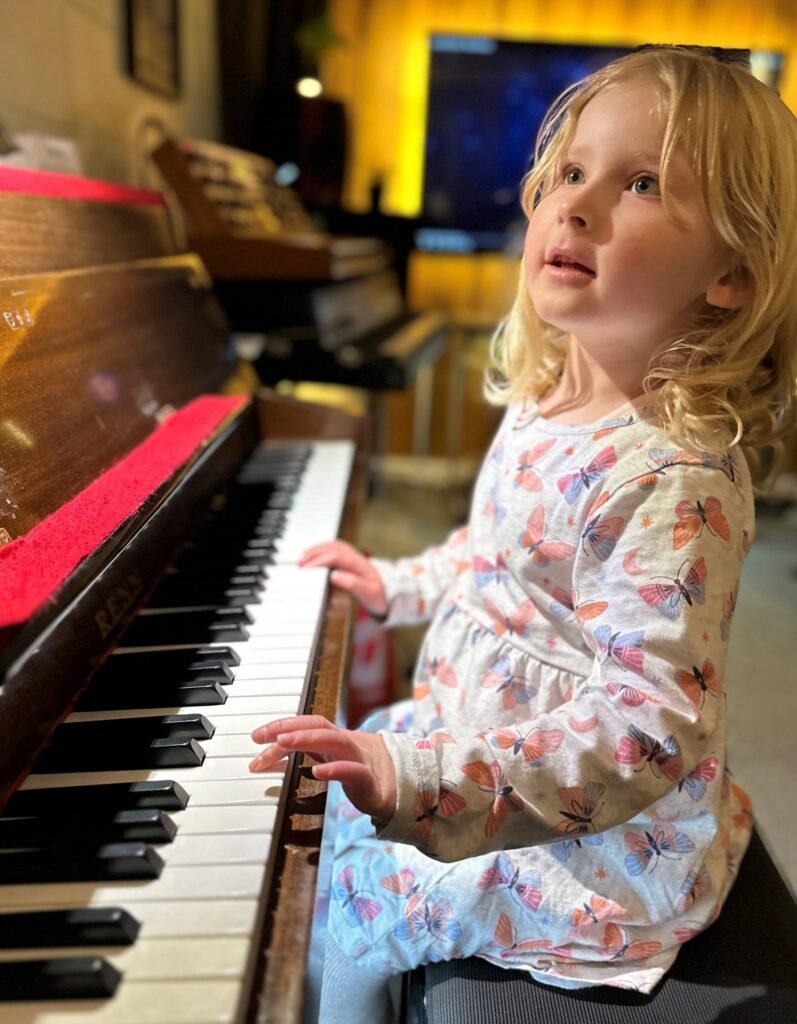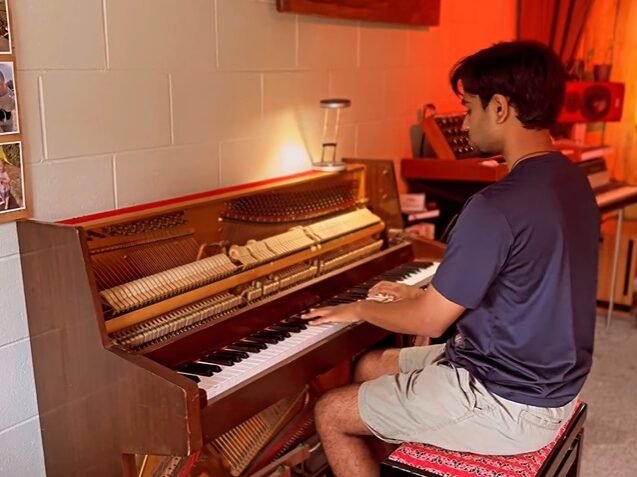To learn how to make piano practice fun, integrate engaging methods like games, varied styles, and setting goals. Encouraging creativity and diverse approaches keeps students motivated and enhances their learning experience.
- Introduction
- Innovative Techniques for Piano Enthusiasts
- Creating a Personalised Practice Routine
- Why Choose Timothy William for a Personalised Piano Practice Routine
- Frequently Asked Questions
- How can technology make piano practice more engaging?
- What are some examples of gamification in piano practice?
- How do I personalise my child’s piano practice routine?
- How to make piano practice fun for beginners?
- What role does collaboration play in making practice enjoyable?
- Why is setting goals important in piano practice?
- How can parents support their child’s piano practice?
- Are there local resources in Auckland for enhancing piano practice?
Piano practice is essential for aspiring musicians, yet it often conjures images of tedious repetition. Understanding how to make piano practice fun is key to maintaining motivation and fostering a lifelong relationship with music. By incorporating dynamic and creative approaches, you can transform practice sessions into enjoyable and productive experiences.
Why Fun Practice Matters
When piano practice is engaging, students are more likely to persevere and develop their skills. Fun practice not only boosts motivation but also enhances cognitive abilities. It encourages students to explore different musical styles and introduces elements of play, making learning feel less like a chore and more like an exciting journey.
By making lessons enjoyable, students stay focused and retain information better, leading to faster progress and greater satisfaction. Timothy William, a renowned piano teacher from Auckland, New Zealand, advocates for this approach, recognising that harnessing the right strategies can significantly improve practice outcomes.
Methods to Enhance Enjoyment
Discovering diverse ways to spice up practice sessions is crucial. Consider incorporating games that involve rhythm and timing, which can turn practice into a fun challenge. Exploring new music genres keeps sessions fresh, ensuring students remain engaged. Setting rewarding goals provides a sense of achievement, further motivating students to practise regularly.
In summary, understanding how to make piano practice enjoyable involves creativity and innovation. By mixing traditional techniques with modern twists, piano teachers can inspire their students, making each session something to look forward to.
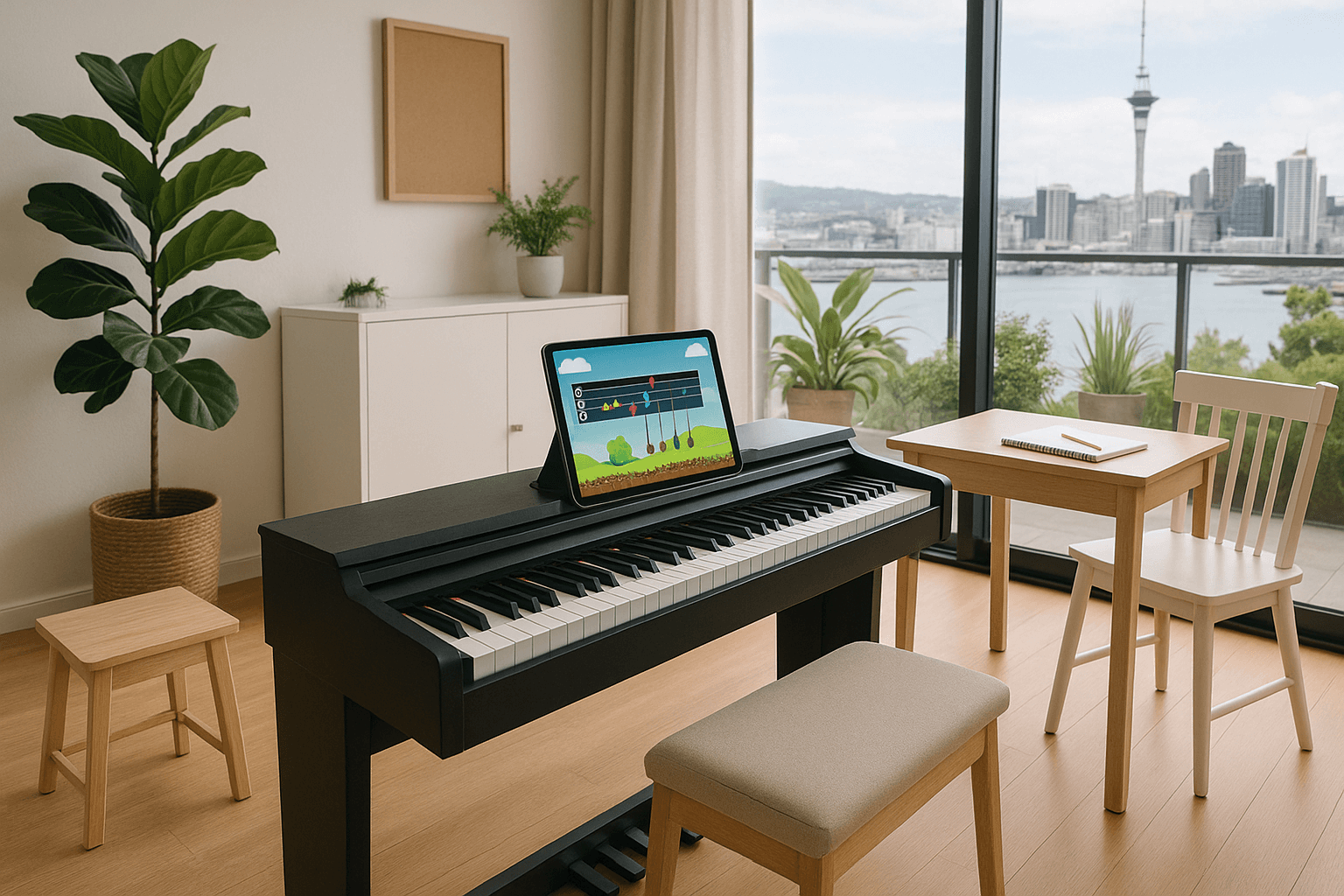
Innovative Techniques for Piano Enthusiasts
Having established the importance of fun in piano practice, it’s time to delve into innovative techniques that can transform mundane sessions into exciting musical journeys. These methods not only enhance learning but also foster a deeper connection with the piano. Whether you are a beginner or an experienced player, integrating these creative approaches will make every minute at the keyboard both rewarding and enjoyable.
Gamification in Piano Practice
One of the exciting trends in music education is gamification, where game-like elements are introduced into practice sessions to boost motivation and retention. Tools like piano apps and online platforms use gamification strategies to make learning scales, chords, and pieces more like playing a game than practising an instrument. These platforms often feature point-scoring systems, achievements, and social elements that add a competitive edge to practice. For instance, earning points for hitting the correct notes or levelling up by mastering a piece can significantly enhance engagement. In Auckland, many piano teachers, including Timothy William, have embraced these technologies to provide students with a dynamic learning experience.
Integrating Technology and Apps
Technology has become an indispensable part of modern piano education. The use of apps, digital pianos, and online resources can greatly enhance the learning experience. Apps specifically designed for musicians offer interactive lessons, sheet music readers, and even virtual accompaniment. These tools allow students to practise more flexibly and interactively, adjusting the tempo of a piece or isolating difficult sections for focused practice. Additionally, recording tools help students track their progress over time, encouraging them to refine their skills continuously. Engaging with these technologies not only makes practice more enjoyable but also bridges the gap between traditional methods and the digital age.
Collaborative Practice Methods
Collaboration can significantly elevate the excitement of piano practice. Duets, group classes, and ensemble sessions introduce a social element to learning, which can increase motivation and enjoyment. Playing with others provides immediate feedback and can teach important skills such as timing and harmony in a practical context. Participating in group performances or recitals in Auckland can provide a platform for showcasing skills, which further motivates practice. These shared experiences cultivate a sense of community among learners and create memorable musical moments that inspire continued growth in piano proficiency.
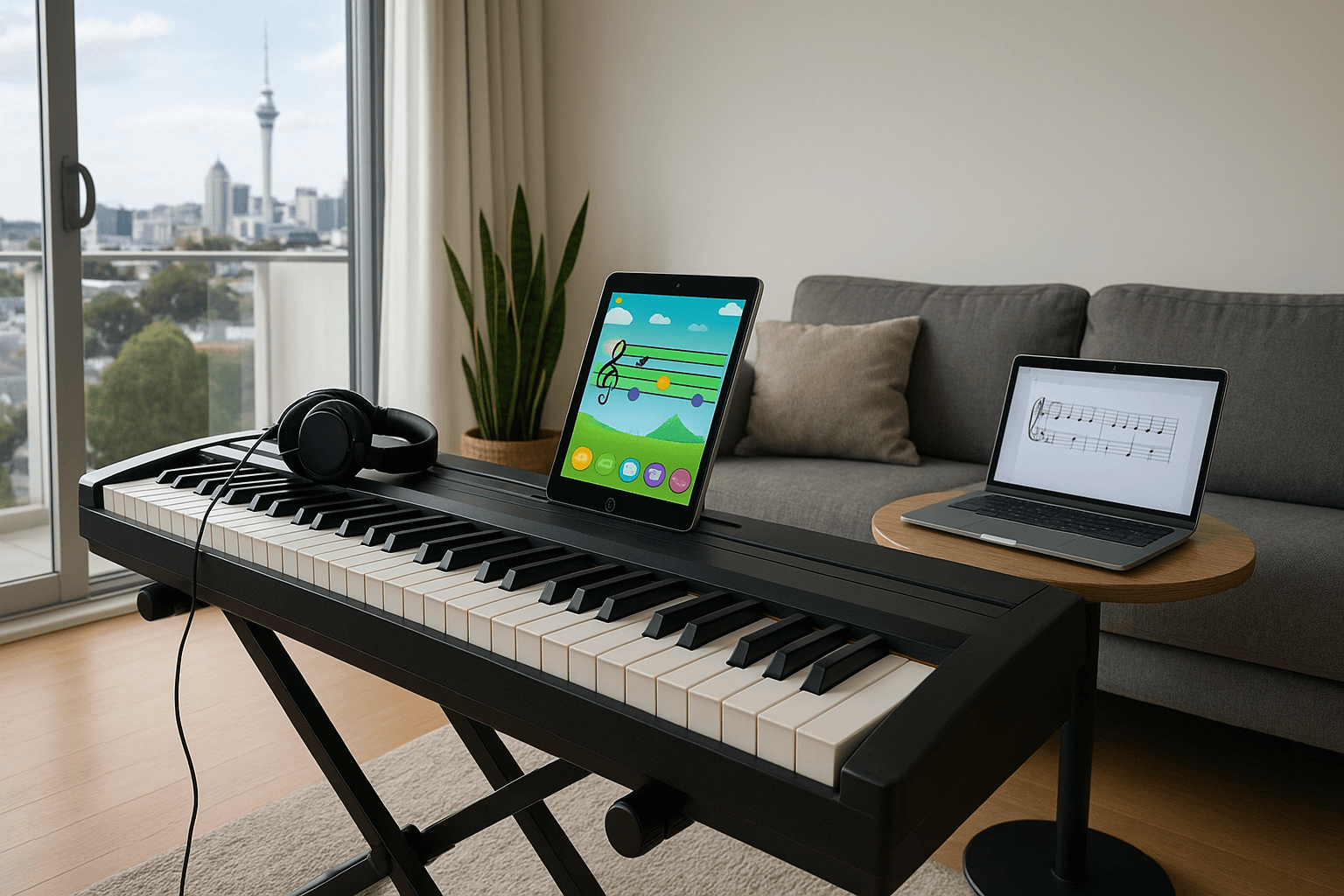
Creating a Personalised Practice Routine
Creating your own piano practice routine can dramatically enhance your learning experience and make piano practice more enjoyable. By tailoring your practice sessions to your interests and goals, you can transform them from mundane tasks into rewarding rituals.
Identify the Core Elements
The first step in crafting a personalised routine is identifying the core elements of practice that resonate with you. Consider what aspects of piano playing excite you the most. Is it learning new songs, mastering scales, or perhaps improvisation? Understanding these interests will guide you in shaping a routine that maintains your enthusiasm and motivation.
Start by listing at least three components that you find valuable. These could include technical exercises, creative play, or even brief music theory studies. Incorporating a variety of elements ensures that each practice session is balanced and caters to different aspects of your musical development.
Set Goals and Track Progress
Once you’ve determined the core elements, setting clear, achievable goals for each can act as a powerful motivator. Break down larger objectives into smaller, specific tasks that can be accomplished on a weekly or monthly basis. For instance, work towards mastering a particular piece, or improving your tempo with regular metronome exercises.
Tracking your progress not only provides a sense of accomplishment but also highlights areas that may need more attention. Tools like practice journals or digital apps can help keep a record of your improvements and setbacks, serving as a roadmap to your success. Reflect on these regularly to understand your journey and stay inspired.
Embrace Flexibility and Adjust as Needed
A key aspect of a successful piano practice routine is flexibility. It’s important to allow room for changes and adjustments as your skills and interests evolve. Perhaps you discover a newfound interest in jazz or classical music — your practice routine should adapt to accommodate these shifts.
Don’t hesitate to switch up your practice tasks or inject fresh activities. Maybe try a new piece or schedule a couple of sessions dedicated to playing by ear. This fluidity keeps your practice dynamic and prevents stagnation, ensuring that you remain engaged and excited about your progression.
In essence, a personalised practice routine is a dynamic framework that grows with you. The effort you put into crafting it can significantly influence your progress and love for the piano.
Looking ahead, consider why choosing Timothy William as your piano mentor in Auckland can magnify these efforts. He brings a wealth of expertise and personalised coaching methods that can elevate your piano practice to new heights.
Why Choose Timothy William for a Personalised Piano Practice Routine
When it comes to learning the piano, finding the right teacher can significantly influence your musical journey. In the vibrant city of Auckland, New Zealand, Timothy William stands out as a dedicated piano teacher who truly understands how to make piano practice fun. His deep knowledge and innovative teaching methods have made him the ideal choice for aspiring pianists who seek to cultivate a love for music through enjoyable and effective practice routines.
Experienced Local Experts
Timothy William brings a wealth of experience to his students. As an esteemed piano teacher based in Auckland, his connection to the local music scene provides a unique advantage. Timothy’s familiarity with regional musical tastes and preferences allows him to tailor lessons that resonate with his students’ backgrounds, thereby enhancing their learning experiences. His calm and encouraging teaching style ensures that students of all ages and skill levels feel supported as they embark on or continue their musical journey.
What Sets Us Apart
One of the key differentiators of Timothy William’s teaching approach is his commitment to making piano practice both engaging and personalised. Unlike traditional methods, which can sometimes be rigid and monotonous, Timothy creatively integrates elements that make learning enjoyable. From using technology to promote interactive learning to adopting a gamified approach to practice, he ensures that each session is more than just a lesson—it’s an experience. Additionally, his focus on creating personalised study plans in Auckland ensures that every student’s unique needs and goals are met effectively.
Timothy William’s reputation speaks for itself. His students consistently praise his patience, expertise, and ability to make learning piano a rewarding adventure. With testimonials highlighting his knack for adapting to individual learning styles, it’s clear why so many choose him to instil a lifelong appreciation for music in their lives. If you’re seeking to turn your piano practice into a lively and fulfilling part of your daily routine, look no further than Timothy William.
As we move forward, the next section will address some of the most frequently asked questions around making piano practice fun. Whether you are a beginner or an experienced player looking to revitalize your skills, our aim is to provide clear answers to help you proceed with confidence.
Frequently Asked Questions
How can technology make piano practice more engaging?
Technology can enhance piano practice through apps that provide interactive lessons, games, and instant feedback, making learning more dynamic and enjoyable.
What are some examples of gamification in piano practice?
Gamification can include setting up point systems for practice milestones, using music-themed games, or incorporating apps that turn learning into a fun challenge.
How do I personalise my child’s piano practice routine?
To personalise practice, understand their interests, set achievable goals, and allow flexibility in choosing pieces they love, ensuring the routine remains enjoyable and productive.
How to make piano practice fun for beginners?
Begin with short, structured sessions focusing on music they are excited about, include musical games, and celebrate small achievements to build confidence and interest.
What role does collaboration play in making practice enjoyable?
Collaborative practice, such as duet sessions with peers or group lessons, can make piano practice more social and fun, fostering a sense of community and motivation.
Why is setting goals important in piano practice?
Setting clear goals helps track progress, providing motivation and a sense of accomplishment, ensuring practice is both purposeful and rewarding.
How can parents support their child’s piano practice?
Parents can support by creating a positive practice environment, encouraging consistency, celebrating progress, and showing genuine interest in their child’s musical journey.
Are there local resources in Auckland for enhancing piano practice?
Auckland offers various resources such as community music schools, workshops, and local piano clubs that can provide additional support and motivation for learners.

